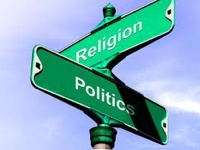Religious Right and Politics – From Iowa to Cairo
Jan 30
 Guess where in the world candidates for political office are pandering to religious conservatives, using religious imagery in political advertisement and participating in political forums in houses of worship? Where some voters are unwilling to support candidates because they do not belong to the majority faith, dismissing a candidate because they are women, and using religious purity as a litmus test for eligibility? If you said Iowa, USA you will be correct. Cairo, Egypt also qualifies as the correct answer.
Guess where in the world candidates for political office are pandering to religious conservatives, using religious imagery in political advertisement and participating in political forums in houses of worship? Where some voters are unwilling to support candidates because they do not belong to the majority faith, dismissing a candidate because they are women, and using religious purity as a litmus test for eligibility? If you said Iowa, USA you will be correct. Cairo, Egypt also qualifies as the correct answer.
The nexus between politics and religion has been on the rise globally for quite some time now. It is an irony that it is the religious right in each country that often expresses the most misgivings about the rise of the religious right in other countries. In America, Republican presidential candidates, with support from the religious right, are the most vocal in their criticism of Islamist politics. On the other hand, Islamists are quick to conflate American hegemony in their region with a war against Islam. The mutual paranoia is palpable.
Elections are underway in Egypt for a new parliament. Openly vying for seats are political parties from the puritanical Salafis, to the conservative Ikhwanis (Muslim Brotherhood) and a plethora of smaller secular groups. After the first round of voting it appears that the religious right, Salafis and the Brotherhood together, will have majority control of the parliament. Similar Islamist victories in Tunisia and Morocco portend an unmistakable trend of increased intertwining of religion and politics in the region.
A recent Pew Research Center poll showed that while a majority of Muslims prefer a significant role for Islam in their politics, substantive differences persist across regions. Majorities in Pakistan, Egypt, Jordan and Nigeria favor changing current laws to allow religiously sanctioned capital punishment for adultery, stealing and apostasy. In contrast, Muslims living under secular democracies in Turkey or Lebanon overwhelmingly reject fundamentalism and self-identify themselves as modernists, even when actively practicing their faith.
As politics face a rightward religious tug across the globe, it will be hasty to stereotype the trend. In the U.S., although the Christian right exerts an enormous influence in politics but the state remains neutral towards religion, the occasional display of Christmas trees in government buildings notwithstanding. Such institutional separation between state and religion is lacking across the Middle East, most disconcertingly in Saudi Arabia and Iran. Will the wave of popular opinions that favor a greater role for Islam in politics inevitably lead to a theocratization of the nascent Middle Eastern democracies? Chances are good that the new democracies in Tunisia or Egypt are unlikely to resemble Saudi Arabia or Iran, but neither will they be Jeffersonian.
Reformist scholars of Islam have asserted that Sharia ought not to be codified as state law. The reasons are tantalizingly simple. A state is a political institution, not a religious authority. A state has to be neutral and beneficial towards all its citizens, not just those who belong to the majority. The Muslim belief in the divineness of Sharia is obviously not shared by people of other faiths. Moreover, the interpretation of Sharia is a fallible human endeavor, often leading to conflicting juristic opinions, which then leaves unanswered the question of whose Islam should the state endorse.
While public policy may reflect the values of the citizenry, it should not be promulgated in the name of any one religion. Even when religious values inform a certain policy, the primary reason for enacting public policy must be secular. A wall separating religion from statecraft is good for both religion and state. Once a state begins to enforce the laws of any religion then the coercive power of the state becomes the primary factor in the determining how religion gets practiced. The state loses credibility and faith loses spirituality. The Quran unequivocally states that there is no compulsion in matters related to religion.
Even in the rough and tumble world of Middle Eastern politics there are faint signs of hope. The Islamist leaders in Tunisia have spoken about the secular democracy of Turkey as their aspiring model. A New York Times report quoted a conservative party leader in Egypt saying, “We don’t accept tyranny in the name of religion any more than we accept tyranny in the name of the military.” The yearning for freedom may ultimately overcome parochial religiosity in politics. From Iowa to Cairo, the world watches with trepidation.
